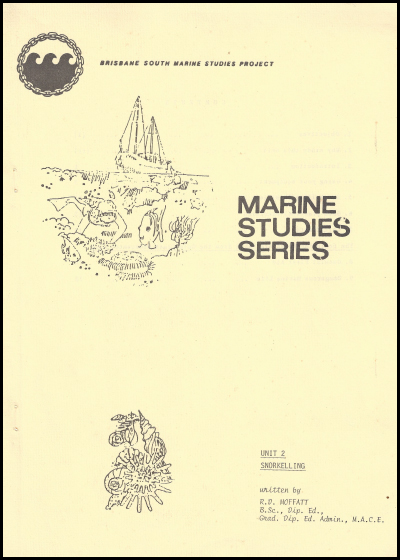1985 BSMSP Snorkelling unit classroom notes

ISBN : 9589813 2 9
Published Date : 01 May 1985
Product Code : 1985 BSMSP
Format : pdf file for download
By Bob Moffatt
Non-commercial school licence
The publisher and author/s of this pdf file grant to the school a revocable, non-exclusive, non-transferable right and licence to use the content, exercises, lab and field work lesson notes within the school for educational purposes only.
Yearly record keeping
To ensure fair payment is made to collecting societies, educational institutions are to record the digital ISBN above.
- To do this go to the school office and ask the IT department or whoever looks after digital book licences to record the ISBN in the school digital library licence catalogue.
Copyright
Except as permitted by the Copyright Act 1968 (Cth), you may not reproduce any of the contents of this publication, without the written permission of the copyright owner.
The title to, and intellectual property rests with the publisher's author/s, illustrators, photographers and design consultants and nothing in the agreement should be construed as transferring those rights to the school.
Educational exemption
There are exemptions under the Act that allow educational and government use of text, images and music scores for educational purposes.
These exemptions are in Part VB of the Copyright Act 1968 (Cth), where you are entitled to reproduce or communicate 10% of the words or one chapter from this file for educational use within your school. If you wish to reproduce or communicate MORE than 10% contact the copyright owner.
For more information, see www.copyright.com.au and www.copyright.org.au.
Teachers Information
Rationale
A study of snorkelling affords an opportunity for students to study two Syllabus Topics of the Multistrand Science Course. It also gets students into the water so that the study of marine life becomes more real. On excursions they can then become more involved with the sea so as to appreciate its beauty.
It also allows the opportunity to trial the 1984 Marine Studies Syllabus Topic 3: Swimming and diving
Acknowledgements
The Project would like to thank the Gold Coast Underwater Club for allowing us to reproduce its training notes in First Aid section and Dr. Rex Neale for his support and advice to the Project.
Notes
This set of notes is a collection of articles. For a complete programme, consult the SEA Note book to see a complete course. The notes are also seen as an evolution to two separate courses- one SCUBA the other SNORKELLING. The notes at present contain a mixture of the two.
SCIENCE FOR RECREATION
One consequence of the rapid growth in the use of technology in our society is the increase of leisure time available. The demand for education in the sensible use of this leisure time provides a challenge to schools. Schools have the opportunity, indeed the responsibility, to provide a balanced curriculum which pays due attention to the development of potential recreational activities. The concept of this core topic is to encourage an appreciation of the role of science and scientific methods in recreational pursuits.
Survival techniques
This topic is concerned with providing the student with skills associated with his well being in outdoor studies which may be extended to adult life. Possible areas of study include navigation (e.g. celestial, orienteering), first aid, bushcraft (e.g. locating food and water, finding protection from the elements).
PERSONAL HEALTH
One consequence of the rapid growth in the use of technology in our society is the increase of leisure time available. The demand for education in the sensible use of this leisure time provides a challenge to schools. Schools have the opportunity, indeed the responsibility, to provide a balanced curriculum which pays due attention to the development of potential recreational activities. The concept of this core topic is to encourage an appreciation of the role of science and scientific methods in recreational pursuits.
Four major areas of development - Reading, Electronic Media, Projects or Hobbies and Survival Techniques - are seen to make a special contribution to this topic. The school program should contribute to al least one of these four areas. Each area contains suggestions for development.
These suggestions are not prescribed but are merely possible avenues of development and could be replaced by alternative subject matter. These four areas arc deliberately kept broad to enable extensive variation in interpretation. The main thrust should be the development of processes, attitudes and skills which can be pursued beyond the immediate school days and which offer an opportunity for continued development.
Contents
1. Objectives
2. Why study this unit
3. Introduction
4. Using your equipment
5. Snorkelling Physiology
6. Some practical exercises
7. Certificate
The following Notes are taken from the Gold Coast Underwater Club
8. General First Aid
9. Dangerous Marine Life


